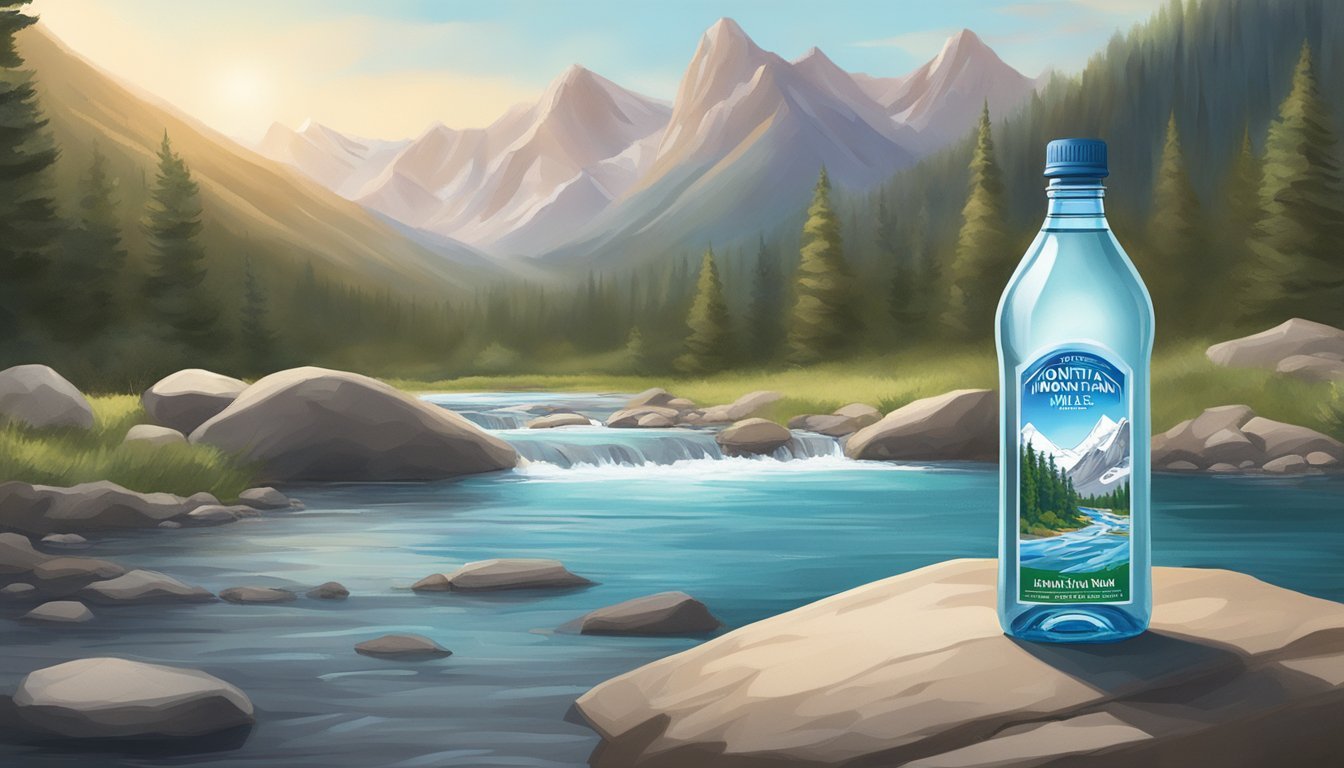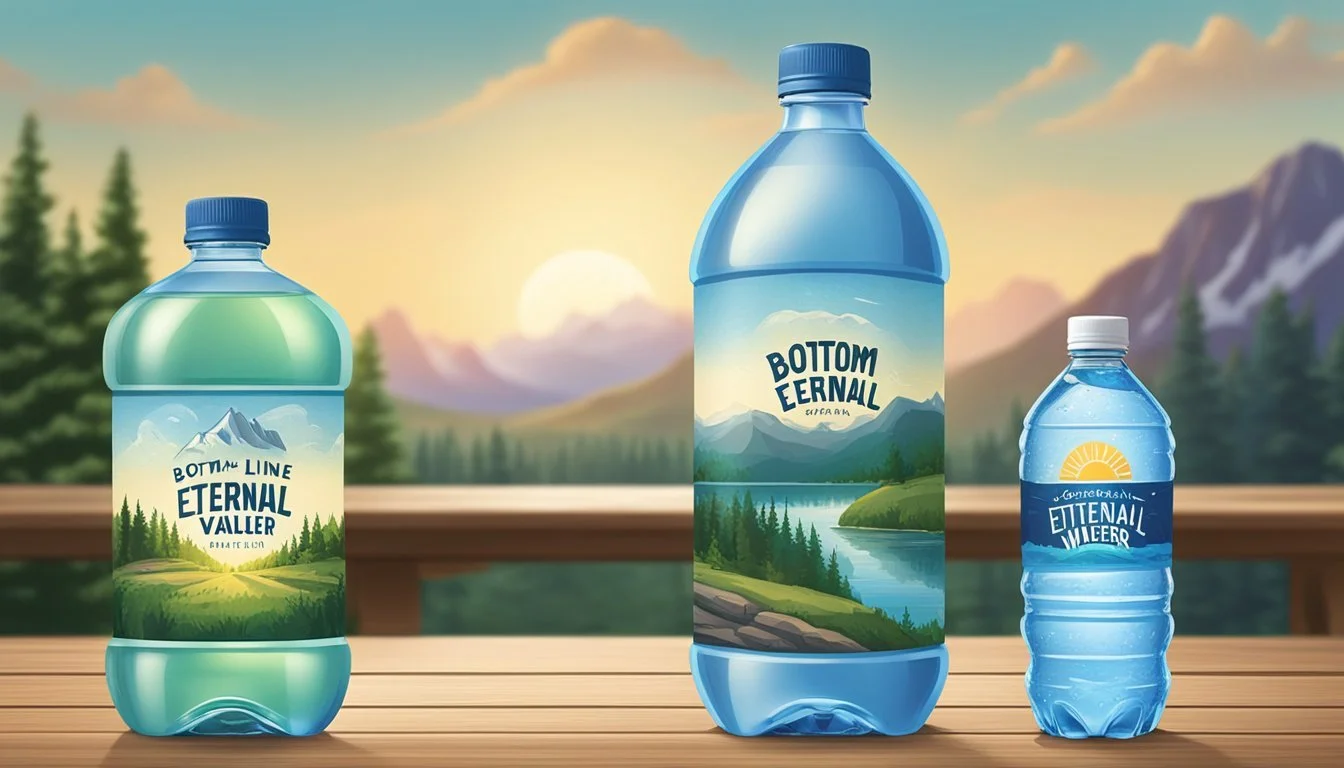Eternal vs. Mountain Valley Spring Water
A Comparative Analysis
Comparing bottled water brands can be a subtle exercise in discerning differences in taste, source, and composition. Two brands that often come up in discussions of quality are Eternal and Mountain Valley Spring Water. They both lay claim to providing a superior hydration experience, but they differ in their sources and the mineral content of their water. Eternal water is known for its naturally alkaline properties, sourced from protected underground springs. On the other hand, Mountain Valley Spring Water boasts a heritage of purity, having been sourced from the Ouachita Mountains in Arkansas, and is often celebrated for its taste and mineral content.
When evaluating which brand is better, one must consider several factors beyond taste, such as the water's pH level, the presence of naturally occurring minerals, and the sustainability of the source. Eternal's natural alkalinity, which some claim can help neutralize acidity in the body, comes from its unique underground journey through mineral rock which infuses the water with electrolytes and minerals. Meanwhile, Mountain Valley Spring Water is sodium-free and has a naturally occurring high pH, which is often preferred by those seeking water with minimal processing.
The debate between Eternal and Mountain Valley Spring Water isn't solely about personal palate preferences; it also encompasses the health implications of regularly consuming each brand, their environmental impacts, and their processing methods. Consumers' choices may be influenced by these factors, in addition to the water's taste profile. The determination of which bottled water is better depends on individual criteria for purity, health benefits, and environmental stewardship.
Understanding Bottled Water
Choosing the right bottled water is crucial for consumers who prioritize both taste and quality. One should consider the types of bottled water available, as well as understand the regulations governing them, to make an informed decision.
Types of Bottled Water
Spring Water: It originates from an underground formation from which water flows naturally to the surface. Mountain Valley Spring Water is an example that is sourced from Garland County, Arkansas, and boasts a balanced pH level and essential minerals.
Mineral Water: This type of water is characterized by its constant level and relative proportions of minerals and trace elements at the point of emergence from the source. No minerals can be added to this product.
Alkaline Water: With a higher pH level than standard drinking water, alkaline water is believed by some to neutralize acid in the bloodstream. However, these claims often lack conclusive research.
Bottled waters can also include well water, purified water, and others, each defined by their origin or treatment process.
Bottled Water Regulations
The International Bottled Water Association (IBWA), along with local entities, sets standards for bottled water quality. Regulations ensure that bottled water production meets or exceeds the standards set by the U.S. Food and Drug Administration (FDA) and Environmental Protection Agency (EPA). Manufacturers are required to test and report on water quality, with the information often made available to consumers for transparency.
Source and Origin
When selecting bottled water, one of the most critical factors to consider is its source and origin. This not only impacts the taste and quality but also the water's mineral content and purity.
Eternal Water Origin
Eternal Water sources its product from naturally occurring springs in various locations, ensuring that the water is naturally alkaline. Key attributes of Eternal Water's sourcing are:
Natural Spring Water: Emphasizes the water's untouched and pure state.
Origin: Indigenous to protected, underground springs in remote locations, preserving its natural composition.
Mountain Valley Source
Mountain Valley Spring Water boasts of an impressive source deeply nestled in the heart of the Ouachita Mountains, Arkansas. Specifics of Mountain Valley's source include:
Ouachita Mountains, Arkansas: The water travels through layers of ancient rock, which enriches it with a unique blend of minerals.
Natural Source: Ensures the water is consistently pure and rich in natural minerals, collected straight from the spring.
The selection of Eternal versus Mountain Valley Spring Water might depend on personal preferences for the water's taste and the beneficial minerals each contains, influenced by their distinct sources.
Composition and Purity
When examining bottled waters like Eternal and Mountain Valley Spring Water, their mineral composition and purity are critical factors in determining their quality. These two aspects impact the health benefits and overall safety of the water for consumption.
Mineral Content and Health Benefits
Eternal Water is naturally alkaline, boasting a pH level that typically exceeds 7.5, indicative of its passage through mineral-rich strata. It contains essential electrolytes such as calcium, magnesium, and potassium, which are vital for hydration and various bodily functions.
Mountain Valley Spring Water, meanwhile, is sourced from a single spring in the Ouachita Mountains and is also alkaline with a pH level ranging from 7.3 to 7.7. It is celebrated for its unique mineral composition, which includes a balance of beneficial electrolytes and minerals like calcium and magnesium, contributing not just to its taste but also to its health benefits.
Mineral Content Comparison:
Eternal Water: High in magnesium, calcium, potassium
Mountain Valley Spring Water: Balanced mineral profile with calcium, magnesium
Presence of Contaminants
Both Eternal and Mountain Valley Spring Water emphasize their commitment to providing clean drinking water. They adhere to strict standards to limit the presence of contaminants, ensuring the consumer receives a pure product.
The term Total Dissolved Solids (TDS) reflects the combined concentration of all organic and inorganic substances contained in a liquid in molecular, ionized, or micro-granular suspended form. Both brands strive to maintain low levels of TDS in their water for a clean taste and minimal exposure to potential contaminants.
Eternal Water undergoes various filtration processes to remove undesirable particles, whereas Mountain Valley Spring Water is naturally filtered and touts a minimal human touch, preserving its natural state.
Contaminant Monitoring:
Eternal Water: Filters and monitors for dissolved solids and contaminants
Mountain Valley Spring Water: Natural filtration, regular testing for purity
Taste and Palatability
In considering whether Eternal or Mountain Valley Spring Water has the better taste profile, one must inspect the subtleties of their flavor characteristics. Taste is a critical factor in determining consumer preference, and the palatability of bottled water is greatly influenced by its source and mineral content.
Flavor Profile Comparison
Eternal Natural Spring Water emanates from protected underground springs and typically has a light taste with a crisp finish. Its flavor profile is often described as pure and refreshing, with a balance of minerals that contribute to its overall taste without overpowering the senses.
On the other hand, Mountain Valley Spring Water is sourced from the Ouachita Mountains and is known for its distinctive crisp taste that's attributed to the rich mineral content naturally filtered through granite-based aquifers. It presents a smooth and refreshing flavor that many discerning consumers appreciate for its clean finish.
Aspect Eternal Natural Spring Water Mountain Valley Spring Water Source Protected underground springs Ouachita Mountains Taste Light and refreshing Smooth with a rich mineral profile Finish Crisp Crisp and clean Noteworthy Mineral Content Balanced, not overpowering Natural filtration through granite-based aquifers
Both brands offer a high-quality water experience, with Eternal appealing to those who prefer a subtle mineral presence and Mountain Valley satisfying those who seek a pronounced but smooth mineral taste.
Health and Hydration
When assessing bottled water options like Eternal and Mountain Valley Spring Water, consumers are particularly interested in two critical aspects: hydration efficiency and the pH levels of the water. These factors can have significant impacts on health and hydration.
Hydration Efficiency
Hydration is essential for maintaining bodily functions, and the source of water can influence how effectively it hydrates. Eternal Water claims to be naturally alkaline, which suggests it may provide superior hydration due to its mineral content. On the other hand, Mountain Valley Spring Water is known for its pure composition, hailing from a natural spring in Arkansas. The natural minerals found in spring water are believed to aid in the body's absorption of water, thereby potentially increasing hydration efficiency.
Comparison of pH Levels
The pH level of water indicates its acidity or alkalinity, which can affect the body's overall pH balance.
Eternal Water typically has a high pH, usually above 7.5, classifying it as alkaline water. A higher pH level may offer benefits such as neutralizing acid in the bloodstream, which proponents argue contributes to improved bodily functions and health.
Mountain Valley Spring Water, meanwhile, maintains a moderately alkaline pH level, ensuring it is above neutral pH but not as high as some artificially alkaline waters. This subtle alkalinity is considered favorable for maintaining a balanced pH in the body without the potential risks associated with very high alkaline levels.
By comparing these bottled waters in terms of their hydration efficiency and pH levels, consumers can make an informed decision aligned with their health and hydration needs.
Environmental Impact
Eternal and Mountain Valley Spring Water companies both have environmental footprints influenced by their bottling and packaging processes, as well as their conservation and sustainability efforts. The environmental impact of bottled water is a significant consideration for consumers who are concerned about the eco-friendliness of the products they purchase.
Bottling and Packaging
Eternal Water is known for its pristine artesian water, but packaging methods impact its environmental footprint. The company uses BPA-free PET plastic, which is recognized as a safe, recyclable material. However, the energy consumed in the production and recycling of plastic is a concern.
Mountain Valley Spring Water, on the other hand, prides itself on offering water in glass bottles, which are 100% recyclable and can be reused more times than plastic before recycling. The inert nature of glass also ensures that there is no leaching of chemicals into the water, maintaining its purity.
Both companies are pressured by environmentally conscious consumers to continue finding more environmentally friendly packaging solutions, such as boxed water, which has a lower carbon footprint compared to plastic and glass options.
Conservation and Sustainability Efforts
The ethos of conservation is central to Mountain Valley Spring Water's brand. They emphasize the preservation of the land surrounding their spring in Arkansas and have implemented various conservation efforts to maintain the natural balance of the area.
Eternal Water's approach to sustainability includes sourcing its water from naturally replenishing springs, thus avoiding over-extraction and allowing for natural filtration processes to occur. Their commitment to environmentally friendly practices is crucial in maintaining the quality of their artesian water while minimizing environmental impact.
Both brands aim to reflect a strong environmental ethos in their operations, with ongoing initiatives to reduce their carbon footprint and improve resource management throughout their supply chains. These efforts contribute to the broader goal of sustainable resource usage in the bottled water industry.
Comparison of Water Treatment Processes
Both Eternal and Mountain Valley Spring Water employ meticulous water treatment processes to ensure the purity and taste of their bottled water products. Each brand's unique approach to filtration and purification methods ensures their water meets or exceeds industry standards.
Filtration and Purification
Eternal Spring Water utilizes a multi-barrier approach that includes filtration to remove particles and impurities. Their purification process may involve the use of microporous filters and ultraviolet light to destroy any microorganisms present, ensuring the water reaches a high purity level before bottling.
Mountain Valley Spring Water, on the other hand, boasts a natural filtration process through the mineral-rich Ouachita Mountain sands and gravels, which enhances the water's mineral content. They maintain a focus on retaining the water's natural quality and taste, with filtration acting primarily as a means to ensure safety without altering the inherent properties of the spring water.
Reverse Osmosis and Distillation
While Eternal Spring Water is not explicitly known for using reverse osmosis, other brands often incorporate this method to further purify their product. Reverse osmosis involves water being pushed through a semipermeable membrane to remove dissolved ions, molecules, and larger particles.
Distillation, often used by water brands for purification, involves boiling the water and then condensing the steam into a clean container. Although Mountain Valley Spring Water does not specify using distillation, this process is recognized for producing very high purity water by removing contaminants that may have a higher boiling point than water.
Both brands prioritize maintaining the integrity of the water while removing undesirable components, but they achieve this through different methods suited to their water source and brand philosophy.
Branding and Market Presence
In comparing the branding and market presence of Mountain Valley Spring Water and Eternal Water, each brand bears a unique identity and presence in the bottled water market, influenced by consumer perception and their availability across grocery stores.
Consumer Perception
Mountain Valley Spring Water has established itself as a premium brand, often associated with its iconic green glass bottles and a legacy dating back to 1871. It's lauded for its clean taste and balanced mineral content, particularly mentioned alongside high-profile endorsements and availability at luxurious venues.
Eternal Water, on the other hand, is recognized for its naturally alkaline water sourced from protected underground springs. It appeals to consumers looking for water with natural electrolytes and minerals. However, it lacks the same historical branding clout as its competitor.
Availability in Grocery Stores
Both brands are available across the United States, but Mountain Valley Spring Water is often found prominently displayed in high-end grocery stores like Whole Foods, signifying its market presence among an eco-conscious demographic that favors premium products.
Conversely, Eternal Water may not be as ubiquitous as Mountain Valley but is nonetheless present in many health-focused and conventional grocery stores. Each brand has distinguished itself not only through branding but also through strategic placement, directly influencing their visibility and perceived value among consumers.
Price and Value
When comparing Eternal and Mountain Valley Spring Water, consumers typically consider cost factors and the value they receive for their purchase.
Cost Comparison
Eternal and Mountain Valley Spring Water are both premium water brands, and their pricing reflects their market position. Eternal Water is known for its naturally alkaline water sourced from the Shasta-Trinity Alps, while Mountain Valley Spring Water boasts of being sourced from the Ouachita Mountains. Both brands are often priced higher than generic bottled water due to their unique sources and the benefits they profess to offer.
A direct cost comparison indicates that prices can vary depending on the point of purchase, the size of the bottle, and whether the water is bought in bulk. For instance:
A 1.5-liter bottle of Eternal Naturally Alkaline Spring Water might be priced around $2.29.
In contrast, a 1-liter bottle of Mountain Valley Spring Water can cost about $1.99.
Consumers should note that prices can fluctuate and that buying in larger quantities or from different retailers may offer variations in value.
Bottom Line
When comparing Eternal and Mountain Valley Spring Water, discerning consumers consider multiple factors such as taste, purity, pH levels, and source. Eternal water, known for its naturally high pH, positions itself among the best alkaline water options. Its alkalinity comes from naturally occurring minerals, making it a strong choice for those seeking the potential benefits of alkaline water.
Mountain Valley Spring Water, on the other hand, is celebrated for its clean taste and balanced mineral content. This brand consistently appears at the top of the best bottled water rankings, with its sourcing from the natural springs of Arkansas contributing to its reputation for quality.
Eternal Water Mountain Valley Spring Water Alkaline water Spring water Naturally occurring minerals Light, clean taste High pH levels Balanced mineral content
Neither brand adds artificial ingredients, standing out for their natural quality.
Eternal offers a higher pH, which may align with consumers searching for alkaline water benefits. While Mountain Valley is preferred for those who prioritize taste and a long-standing tradition of quality. Both provide exceptional hydration options, but for different reasons and consumer preferences.
The choice between Eternal and Mountain Valley ultimately depends on individual priorities—whether one values the alkaline qualities of Eternal or the pure taste and mineral balance of Mountain Valley.








